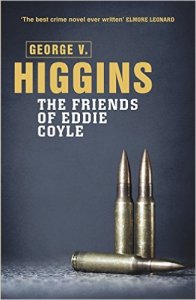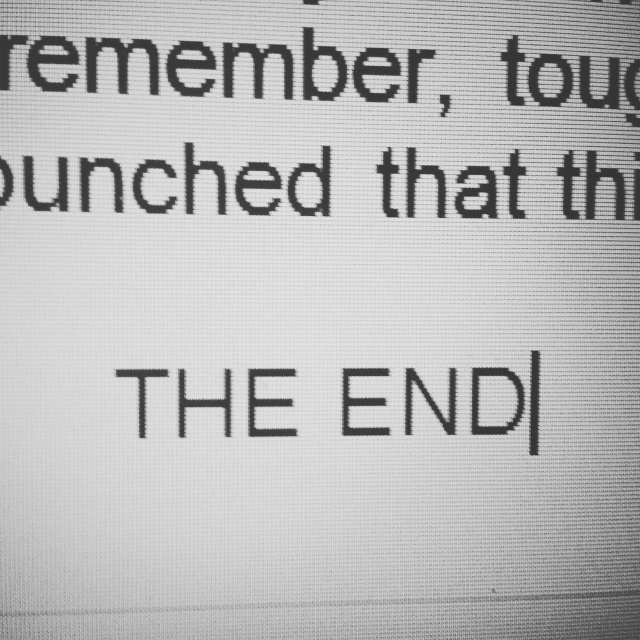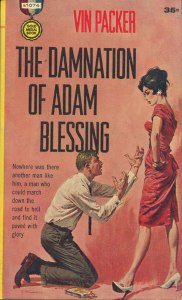
John Henry sat back in the hard, uncomfortable chair to try and find a position that didn’t send his ass to sleep. The plastic farted in the silent room and the red-faced man turned his face to him. John Henry tried a smile but the red-faced man looked away.
“Well, Jesus,” John Henry said, standing up, “is nobody coming to this damn thing, or what?”
He strode across the classroom and stuck his head out into the hall. From all the other adult education classes came the sounds of talking and learning. He came back over.
“You wanna do this, or what?” John Henry said.
“Do what?” the red-faced man said.
John Henry picked up his book from the floor. “Talk about this thing.”
“What’s the point?” the red-faced man said. “No teacher to sign us off. Nobody’ll believe we’ve been here, anyway.”
“We’ll get one of these other bastards to sign us off. Get ’em at the end of one of their lessons. Tell ’em we’ve been here all this time, no sign of Miss Tightass.”
“And so, what?” the red-faced man said. “Meantime talk about this damn book?”
“That’s what we’re here for, isn’t it. Court-appointed rehabilitation.”
The red-faced man shook his head. “What’s the point?” he said again.
“But I liked the damn thing,” John Henry said. “Didn’t you read it?”
“Course I did.”
“And?”
“And …” The red-faced man shrugged.
“You didn’t like it?” John Henry said. “Whaddaya mean you didn’t like it? You nuts? All the crap they’ve been forcing down our throats all these weeks, book like this comes along and you don’t like it. Mister Critic, all of a sudden, huh?” John Henry laughed. “Book like this is real, you know what I’m saying. All that other crime stuff, it’s not real. This is real. It’s just about the real-est book I ever sat down and read.”
“Ah, well, sure,” the red-faced man said, nodding his head. “It’s real. Sure, yeah, I get that.”
“This George V. Higgins,” John Henry said, reading from the front cover of the book, “he knows his stuff, musta been around real criminals a few times. Don’t you think?”
The red-faced man was still nodding. “Sure, sure.”
“He knows how we talk, what we talk about–”
“Oh, well, hey,” the red-faced man said, “while we’re talking about dialogue, let’s really say something about it.”
“Don’t tell me you didn’t like the dialogue,” John Henry said. “Man, I could believe almost anything but you bad-mouthing the dialogue. Only that other guy — what’s his name? — Elmore Leonard. Only Elmore Leonard can get his guys to talk like this Higgins boy can. If anything, man, I think Higgins got him beat.”
The red-faced man was staring at him. “You gonna let me finish, or what? I didn’t say the dialogue was bad, did I? You hear me say that?”
“What are you saying, then?” John Henry said.
“I’m saying, don’t you think there was a little too much of it? The whole damn book’s nothing but dialogue, just about.”
“Well, and so what? Makes it easy to read, doesn’t it? You spend long on this one? I’m willing to bet you flew through this thing, double quick.”
“Well, what of it?” the red-faced man said. “They hand out awards now for making books quick to read? He didn’t put in no descriptions or nothing.”
“Sure, he did,” John Henry said.
“Hardly any.”
“Not all that much,” John Henry said, “but enough. You wanna know about warts and the colour of their goddamn eyes, or something?”
“I just got confused, is all,” the red-faced man said. “At the beginning. Who was who. What was what.”
“Ah, well, hell, you got confused, huh? You got confused. So this Higgins fella’s to blame for you being confused.” John Henry leaned forward a little. “I get the impression that it don’t take all that much.”
“Hey, fuck you.”
“You got a problem with a bit of subtlety, huh? Want everything handed to you on a plate? You gotta work for some things in this book, think about it maybe a little. Use that big old brain of yours, for a change.”
The red-faced man gave him the bird.
John Henry sat back in his chair and laughed loudly. When he’d finished, he said, “Well, and what else?”
The red-faced man gave it some thought. Sounds from all the other lessons came down the hall. From a room upstairs came the sound of tuneless singing.
“Well, still with the dialogue,” the red-faced man said.
“Oh, Jesus–”
“Most of the time those guys’re just talking about nothing, you know what I mean. Telling each other about this guy they once knew. Some job they were on once, or this time they were in prison. Talking about their wives.”
“Sure,” John Henry said. “They shoot the shit. Just like life.”
“But this ain’t life, is it?” the red-faced man said. “It’s a goddamn book. Get to the story.”
“Whoa, whoa, whoa,” John Henry said. “Here’s where you’re wrong. The story’s in there, man, you just gotta pay it some mind. You gotta tease it out of there, from between what they’re saying.”
The red-faced man clucked his tongue.
“You want hand-holding, do you?” John Henry said.
“Nah,” the red-faced man said, “I just got confused a few times, is all.”
“Back to this–”
The red-faced man sat forward and pointed a finger at John Henry. “You wanna know what it reminded me of? It reminded me of those movies. Those movies that guy makes. Tarantino.”
“Hey,” John Henry said. “You’re right there. I bet that Tarantino guy could make a tough as hell movie out of this book.”
“They already made a movie out of it,” the red-faced man said. “Robert Mitchum. I seen it. So you tell me, smart guy, who’s Tarantino gonna find could play this guy Coyle as good as old Bobby Mitchum?”
John Henry shrugged.
“But anyway,” the red-faced man said, “you’re gonna make me go losing my train of thought here. I’m willing to bet that little Tarantino pipsqueak’s read a couple of this Higgins guy’s books in his time. Read ’em cover to cover and thought, hey, I could do that. With the dialogue, you know. Talk like a tough guy.”
“That Tarantino writes great dialogue.”
“Sure, sure,” the red-faced man said. “On the surface, sure. Shoot the breeze stuff. Slice o’ life. Good old guys talking about movies and such. But you know what the problem is with that guy? All his characters? Every one of the suckers talks with the same goddamn voice. And if you ever see this Tarantino guy — like in an interview, or something, you know? — then it all clicks, and you say, hell, that’s the voice. All his characters talk in the same goddamn voice, and they all talk as if they was this Tarantino guy.” The red-faced man laughed. “Every single goddamn one of ’em.”
John Henry thought about it. “Well–” he said. He pursed his lips. “I guess they all do.”
“So this is what I’m talking about,” the red-faced man said. “It gets confusing to hear all the same guys talking in the same goddamn voice. You don’t know what they look like, they hardly ever do anything. Just stand around yakking in the same goddamn voice.”
John Henry thought about it. There was a long silence. “I just think you’re wrong, is all,” John Henry said eventually. “It’s a good book.”
“Hey, you hear me saying it wasn’t a good book?”
John Henry looked startled. “What the hell we been talking about here?”
“I just said the way this Higgins guy wrote it confused me a coupla times. But I got the hang of it eventually. I enjoyed it.”
John Henry laughed and shook his head in disbelief. “He liked it,” he said to himself, still shaking his head. “Coulda fooled me.”
“Nah,” the red-faced man said. “It’s like you said earlier. It’s real, man. All the guys. Way they fuck each other over any chance they get. Believe me, I known a few guys just like ’em in my time. Act big and tough on the outside, talk like tough guys, then you get ’em in a tight spot, they get weak legs all of a sudden. Rather rat you out than do anything else, near enough. Practically go running to the cops first chance they get.”
“It’s why I was in this last time,” John Henry said. “Guy on this last job, he got hisself picked up for something else, just kids stuff, a goddamn stolen bike. Can you believe it? Stole a bike ’cause he didn’t have no other way to get across town. Car was out with his girlfriend, hadda go see her mother. Saw a bike up against a wall, no lock or nothing. First thing he does when they took him in is start singing. Singing ’bout things they weren’t even asking him. What were they gonna do? Send him down for life? Over a bicycle? But he sang. All they had to do was tickle him a little, opened his mouth.”
“Yeah,” the red-faced man said, “all o’ that. I liked that. You can’t trust nobody in this game, that’s the truth.”
“Ain’t it just.”
John Henry and the red-faced man shook their heads to themselves while they thought about it. They fondled the wrinkled secondhand books as they thought.
“So after all that,” John Henry said, “we’re in agreement?”
“I guess so.”
“Shit!” John Henry said, standing up. “We coulda got all that over with a long time ago, ‘stead o’ talking all this crap about you getting confused. Fucking Tarantino.”
He started walking over towards the window, undoing the button of his breast pocket with a couple of gnarled fingers.
“What are you doing?” the red-faced man said.
“Having a cigarette while I wait the time out. Lesson’s over. We’re in agreement. Good book. Ain’t nothing else to talk about, is there?” John Henry looked over at the red-faced man as he put a cigarette in his mouth and lit it.
The red-faced man shrugged and said, “Sure, we wait it out.”
“Just sit there in silence and try to use that big brain o’ yours for something useful.”
The red-faced man gave him the bird again, and John Henry chuckled. He opened the window a crack and blew the smoke out of there.
“It’s no smoking in here,” the red-faced man said.
“Oh, is that so? You gonna tell on me to teacher?” John Henry said.
“Maybe.” He winked. “Can’t trust anybody in this game, ain’t that right?”
















